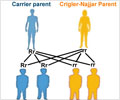Scientists have identified a new gene mutation that is associated with frontotemporal dementia-a common type of the condition, which is also known as Prick's disease.
Frontotemporal dementia involves progressive shrinking of the areas of the brain that control behaviour and language. Language problems, personality changes, and inappropriate social behaviour are its symptoms.Unlike Alzheimer's disease, this Frontotemporal dementia does not affect memory in the early stages, according to the background information in an article published in the journal Neurology. The genetic form of the disease is rare, and most cases occur randomly, says the write-up.
"We are hopeful that this finding (new genetic mutation) will help us better understand how this disease works and eventually help us develop new therapies for the disease," said study author Dr. Amalia Bruni of the Regional Neurogenetic Centre in Lamezia Terme, Italy.
The researchers discovered the new mutation in the gene named progranulin in an extended family in southern Italy. The genealogy of this family, 36 members of which have had frontotemporal dementia, has been reconstructed for 15 generations, going back to the 16th century.
The researchers say that the mutation in a gene on chromosome 17 halves the production of progranulin, a protein growth factor that helps brain cells survive.
For the study, the researchers conducted DNA tests on 70 family members, including 13 people with the disease. They found the new mutation in nine of the family members with frontotemporal dementia, and 10 people who were too young to have the symptoms of the disease. But four people with the disease did not have the gene mutation.
Advertisement
"These results are intriguing, since the family has two genetically distinct diseases that appear almost identical," Dr. Bruni said.
Advertisement
"We would have expected to see cases with two copies of the mutated gene, especially since this family shares much of the same genetic material, as there have been at least five marriages between first cousins over the years," Dr. Bruni said.
"It's possible that loss of both copies of the progranulin gene leads to the death of embryos, and that's why there were no cases with two copies of the mutated gene," the researcher added.
The researchers are now planning to conduct a study to identify the modifying factors responsible for the severity of the disorder, and to identify the second gene responsible for dementia in the same family.
"Another intriguing aspect in this Italian family is the variable age at onset, which ranged from 35 to 87 years in the family members who inherited the same mutation. Our future research will try to identify the modifying factors responsible for the severity of the disorder," said study co-author Dr. Ekaterina Rogaeva of the Centre for Research in Neurodegenerative Diseases at the University of Toronto.
Source-ANI
JAY/M











